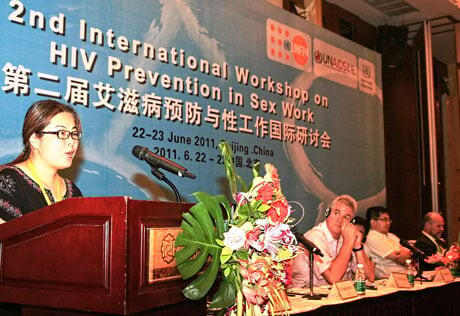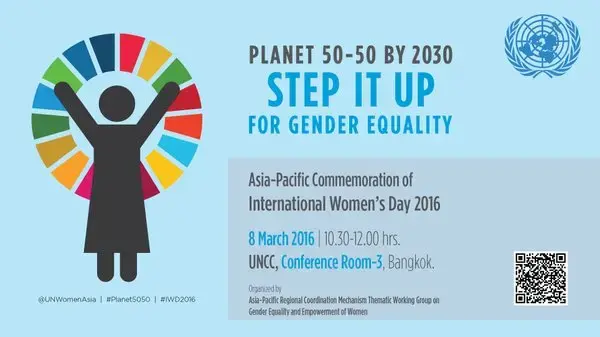BEIJING (UNFPA/UNAIDS/WHO press release) – Sex workers’ grassroots organizations met with UN agencies and government representatives to discuss how to further efforts to reduce HIV infections among sex workers and clients.
Held on 22-23 June, the Second International Workshop on HIV Prevention in Sex Work was attended by over 100 participants from China and other countries in Asia-Pacific region. The workshop was organized by the China office of UNFPA, the United Nations Population Fund, with support from the Joint United Nations Programme on HIV/AIDS (UNAIDS), World Health Organization (WHO) and Government of Luxemburg.
After the first International Workshop that was held in April 2007, the objectives of the second workshop were to discuss the current situation of sex work and HIV in China and border areas, and to reach a common understanding on the recommended strategies for the duration of China’s next five-year AIDS Action Plan (2011-2015).
“Only we who really understand sex workers know what services are most effective,” said Ye Haiyan, a representative from a grassroots sex workers’ network. While sex workers are becoming more actively involved through forming their own communities and networks, their voices have not been strong enough to reach policy makers and donors.
There was considerable discussion around the stigma and discrimination faced by sex workers, and the impact this has on their willingness and ability to access lifesaving prevention and treatment services. Data presented showed that between 2007 and 2009, only 37 per cent of sex workers tested for HIV in the previous 12 months knew their results.
Research by the China Sex Workers Organizations Network Forum also showed that police-led 'crackdowns' in 2010, have had an adverse impact on HIV-prevention efforts. Almost 40 per cent of respondents (170 out of 437) reported that they continued to engage in sex work during 'crackdowns', but were forced to do so in more obscure locations or to frequently change locations. These findings demonstrate that 'crackdown' style approaches significantly increase the difficulty of reaching sex workers with effective HIV-prevention services and information.
“Success in achieving the 25 per cent reduction in new HIV infections by 2015, as set in China’s National Five-Year Action Plan, requires focused efforts to prevent new infections among sex workers,” noted Mark Stirling, UNAIDS Country Coordinator in China.
At the recent 2011 High-Level Meeting on AIDS at the UN in New York, national governments, including China, made specific commitments to 'redouble efforts to achieve the Millennium Development Goal (MDG) 6 – to halt and reverse the spread of HIV by 2015. Stirling urged the participants to discuss explicit targets for reducing new HIV infections and AIDS deaths among sex workers in China in light of the Political Declaration on HIV/AIDS adopted at the high-level meeting.
“HIV has been the most challenging MDG for many developed and developing countries, including China,” said Urmila Singh, officer-in-charge of UNFPA China. Sexual transmission continues to be the primary mode of HIV transmission; more efforts should be committed to targeting the most-at-risk and hardest-to-reach sex workers. They include low-income, less-educated or street-based sex workers, and those who use substances including new drugs, as well as sex workers from ethnic minorities in poor and remote areas.
The workshop explored strategies to improve HIV-prevention efforts among sex workers and clients, including approaches to addressing violence against sex workers, and responding to the challenges arising from the high levels of mobility of many sex workers and clients due to both internal and cross-border migration.
The consultation generated a set of priority actions. First and foremost, it was agreed that sex workers need to be effectively involved in policy formulation, planning, and the design and delivery of programmes intended to reach sex workers. Representatives of the Ministry of Health expressed their commitment to strengthening the involvement of sex workers’ community-based organizations in the HIV response.
Second, it is essential that efforts are made to build supportive environments which ensure that HIV-prevention efforts among sex workers and their clients are successful. This requires shared understanding and closer collaboration between different departments, including public health and public securities in particular.
Third, a comprehensive package of services should be defined and promoted. The package should include peer-based information and education; sexual and reproductive health services, including diagnosis and treatment of sexually transmitted diseases, condoms, voluntary HIV testing, and counselling; and effective referral to HIV treatment, care and support as needed. Scaling-up of effective prevention among low-income, street-based sex workers should be prioritized.
Fourth, monitoring and evaluation of interventions for sex workers must be strengthened to measure the results of programmes.
Finally, opinion leaders and the media have an important role to play in challenging social norms that perpetuate stigma and discrimination against sex workers.
The UN system in China will continue to support such platforms to facilitate direct dialogues with sex workers’ organizations and closer collaboration of stakeholders to strengthen responses among sex workers in China.
For more information, please contact:
Gao Cuiling, gao@unfpa.org
Guy Taylor, taylorg@unaids.org
He Jinglin, heji@wpro.who.int




